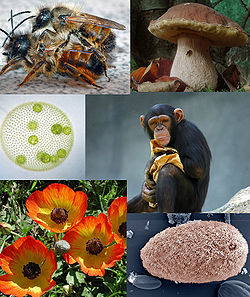- Eukaryote
-
Eukaryota
Eukaryotes

Divers eucaryotes Domaine Eukaryota
Whittaker & Margulis, 1978Taxons de rang inférieur Eukaryota : Parcourez la biologie sur Wikipédia : Le domaine des Eukaryota ou eucaryotes[1], (du grec eu, bien et karuon, noyau) regroupe, selon la nomenclature de Whittaker, tous les organismes compris dans quatre grands règnes du monde du vivant : les animaux, les champignons, les plantes et les protistes (auxquels il convient d'ajouter les Chromistes selon la nomenclature de Cavalier-Smith, ce clade est néanmoins remis en cause par des études récentes). Ils sont caractérisés principalement par des cellules qui possèdent un noyau. Ils constituent donc un très large groupe d'organismes, uni- ou pluricellulaires, définis par leur structure cellulaire.
Sommaire
Cladogramme des Eukaryota
Neomura Eukaryota Unikonta Opisthokonta Fungi (champignons)
Metazoa (animaux)
Bikonta ? Apusozoa
SAR Alveolata Article détaillé : Eukaryota (classification phylogénétique).N.B. La position des Rhizaria était hésitante entre une articulation avec les Excavata ou les straménopiles.
Définition
Les cellules eucaryotes possèdent, par opposition aux procaryotes (Archées et Bactéries) :
- des organites, divisant l'espace cellulaire en compartiments spécialisés, tels
- le noyau (contenant l'ADN),
- les mitochondries, le réticulum endoplasmique, l'appareil de Golgi, les ribosomes, les peroxysomes, les chloroplastes et les vacuoles chez les plantes ;
- un cytosquelette, composé essentiellement d'actine et de myosine ;
- la faculté à réaliser l'endocytose ;
- un ADN divisé en plusieurs chromosomes;
- une division cellulaire appelée mitose (faisant intervenir centrioles et fuseau mitotique) ;
- une véritable reproduction sexuée, où chaque type sexuel apporte une part égale de matériel génétique.
Article détaillé : Cellule (biologie).Exemples d'Eukaryota
L'espèce humaine
Une paramécie
Un champignon: l'Amanite tue-mouche
Origine de la mitochondrie
La mitochondrie serait le résultat de l'endosymbiose d'une alpha-protéobactérie (une rhodobactérie) par une cellule eucaryote primitive.
Références
- La plus connue des synthèses francophones est celle proposée par Guillaume Lecointre et Hervé Le Guyader dans Classification phylogénétique du vivant, parue aux éditions Belin en 2001 (3ème éd. en 2006).
- ↑ ou encore Eukarya
Voir aussi
- Eukaryota (classification phylogénétique)
- Arbre phylogénétique
- Classification phylogénétique de Guillaume Lecointre et Hervé Le Guyader
Liens externes
- (en) Phylogénie moléculaire des Eucaryotes
- (en) arbre phylogénétique du vivant « Tree of Life »
- (en) arbre phylogénétique du vivant - Université de Berkeley
- (fr) http://cgdc3.igmors.u-psud.fr/microbiologie/maitrise.htm
- Portail de la microbiologie
- Portail de l’origine et de l’évolution du vivant
Catégorie : Eucaryotes - des organites, divisant l'espace cellulaire en compartiments spécialisés, tels
Wikimedia Foundation. 2010.





